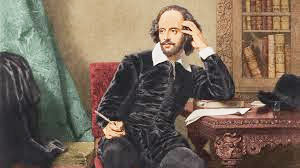 *
*
Article by Off the Shelf Correspondent Michael Steffen
To dot our i’s and cross our t’s, technically Shakespeare would be measured as the greatest dramatist of the English language. He has been vaulted to posterity, and in no small way, largely due to his plays, which are written in verse, but so are the plays of the great precedent cultures. Aristophanes and Sophocles wrote their plays in verse, yet it is Homer who wears the laurels as the father poet of Greece.
The same is true for Rome, with its popular literature from the playwrights Plautus and Terence (who exerted a great influence on Shakespeare’s drama), while Virgil with his Aeneid is the eternal city’s, and the early West’s, fountain from the myrtle shades of literary inspiration. Molière and Racine wrote high neoclassical drama in masterly Alexandrine verse, but the French, very particular themselves about classification, would never call either of them “poets.” Pierre de Ronsard of the High Renaissance monarchs Francis I and Henry II sits high on a pedestal as the voice of the Muses of recognizably modern French for educated francophones.
Even in Shakespeare’s day, as Peter Ackroyd notes in his biography, “[t]here was no question … of creating an eminent ‘career’ out of writing for the playhouses; these men were not established poets such as Samuel Daniel or Edmund Spenser, patronized by royalty and financed by nobility. They were journeymen or workmen. Whether Shakespeare considered himself in this light is an open question.”
Sure Shakespeare wrote an edificial sonnet sequence, from which a good deal of the language’s wisdom is quoted. Yet, great as that sequence is, promising eternity to his beloved (and making good on that promise), it would hardly constitute the ecstatic and robust popularity Shakespeare holds to this day as The Bard, English of English terms for the culture’s preeminent master of verses. America, our country, I think is chronologically as Democratic as it is demographically. Though we continue to remember and somewhat revere father Walt and mother Emily, there really is no notion of a greatest American poet, not in the sense England has celebrated Shakespeare or Italy enshrined Dante.
Yet Shakespeare also wrote substantial narrative poems, not meant for the stage. Two of these works in particular, Venus and Adonis and The Rape of Lucrece, are noteworthy literary oeuvres, which were the first of the poet’s works to appear under his name in print in London and won him fame as England’s proud example of a contemporary (1590s) dolce stil nuovo poet to rival the famous poets of Italy. Even though, observes the Arden Shakespeare Introduction to Shakespeare’s Poems:
“[h]is claim to the continued attention of posterity rests essentially on the four ‘great’ tragedies [in which he explored the mysteries of good and evil], Hamlet, Othello, King Lear and Macbeth…this is not how Shakespeare was seen by his contemporaries. His literary reputation was quickly established in the mid-1590s on the strength of the two long poems, currently the most neglected items in the Shakespeare canon…”















Reader Comments